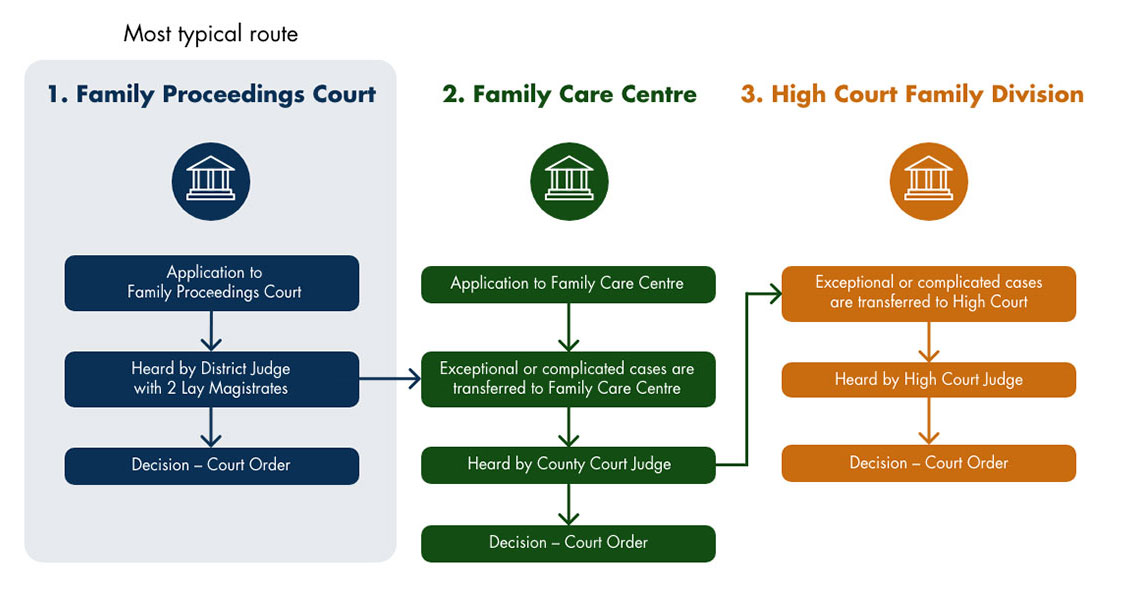The family courts specialise in arrangements for children after family breakdown.
The family courts can be located in the same building or courtroom where people who are accused of a crime are tried, but family courts are completely different to the criminal court or other civil courts.
Judges make court Orders for contact, residence and other arrangements.
In the Family Proceedings Court, the judge may be accompanied by lay magistrates.
There is no jury and the court hearings are not public.
In Northern Ireland, applications to a court to decide issues related to a child in a family breakdown usually start at the Family Proceedings Court.
Family courts do not deal with divorce or civil partnership issues - see NI Direct Getting a Divorce or Dissolving a Civil Partnership.
Arrangements for a child
Arrangements for children after family breakdown include deciding where they will live, for how long and when they will see the parent they do not live with and other matters related to caring for the child. See Family court Orders.
When a judge is asked to make a decision about a child, they are required to put the best interests of the child first. The judge will listen to the parents' points of view, but all decisions are based on what they believe is best for the child.
The child does not attend the court. It is usual that the judge will request professionals to give their opinion about what is in the child’s best interests, and they will take this into account.
The decision of a judge - called a court Order or an Order – is legally binding. This means that if you are named on the Order you have to do what the Order states. See Change or cancel an existing Order.
A typical family case
Most family cases start in the Family Proceedings Court. The diagram below shows the overall process in a typical case in this court.
The process is formal following the steps required by the court.
Each family case is different and how it progresses depends on the circumstances of the case. This diagram gives you an idea of what might be involved.
Skip to textual description of Flow chart diagram
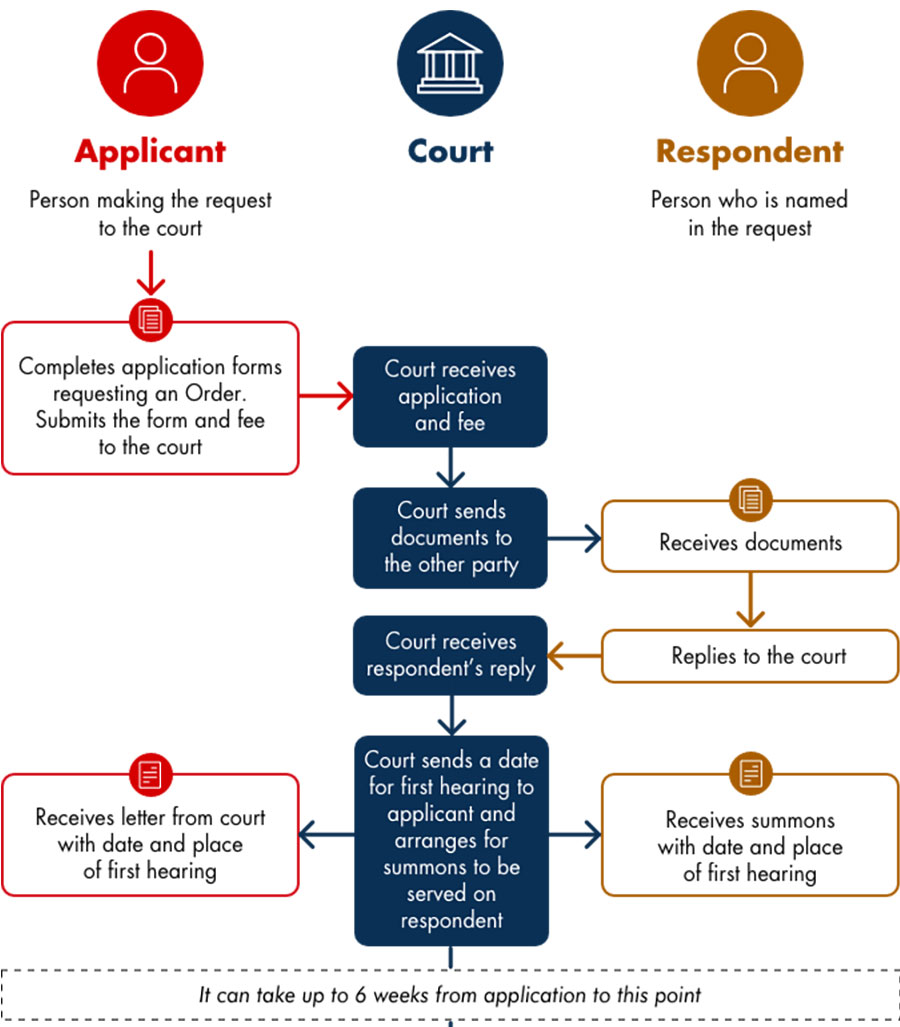

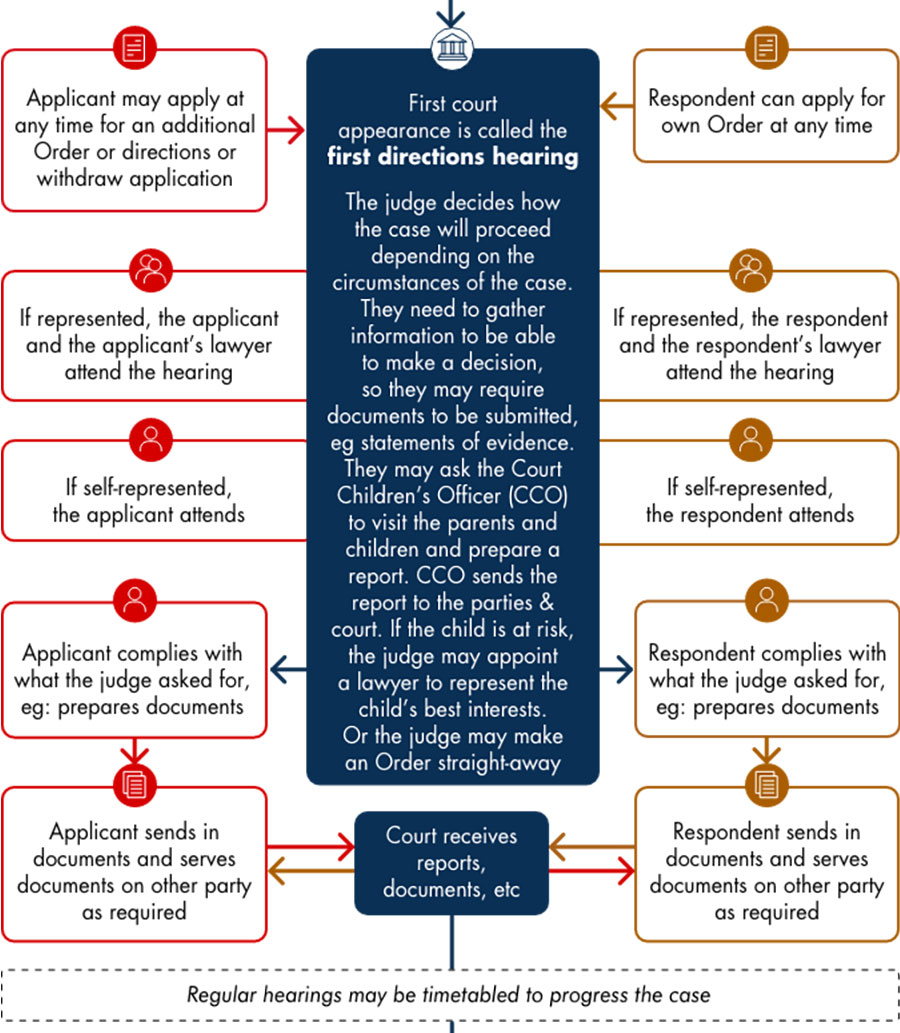

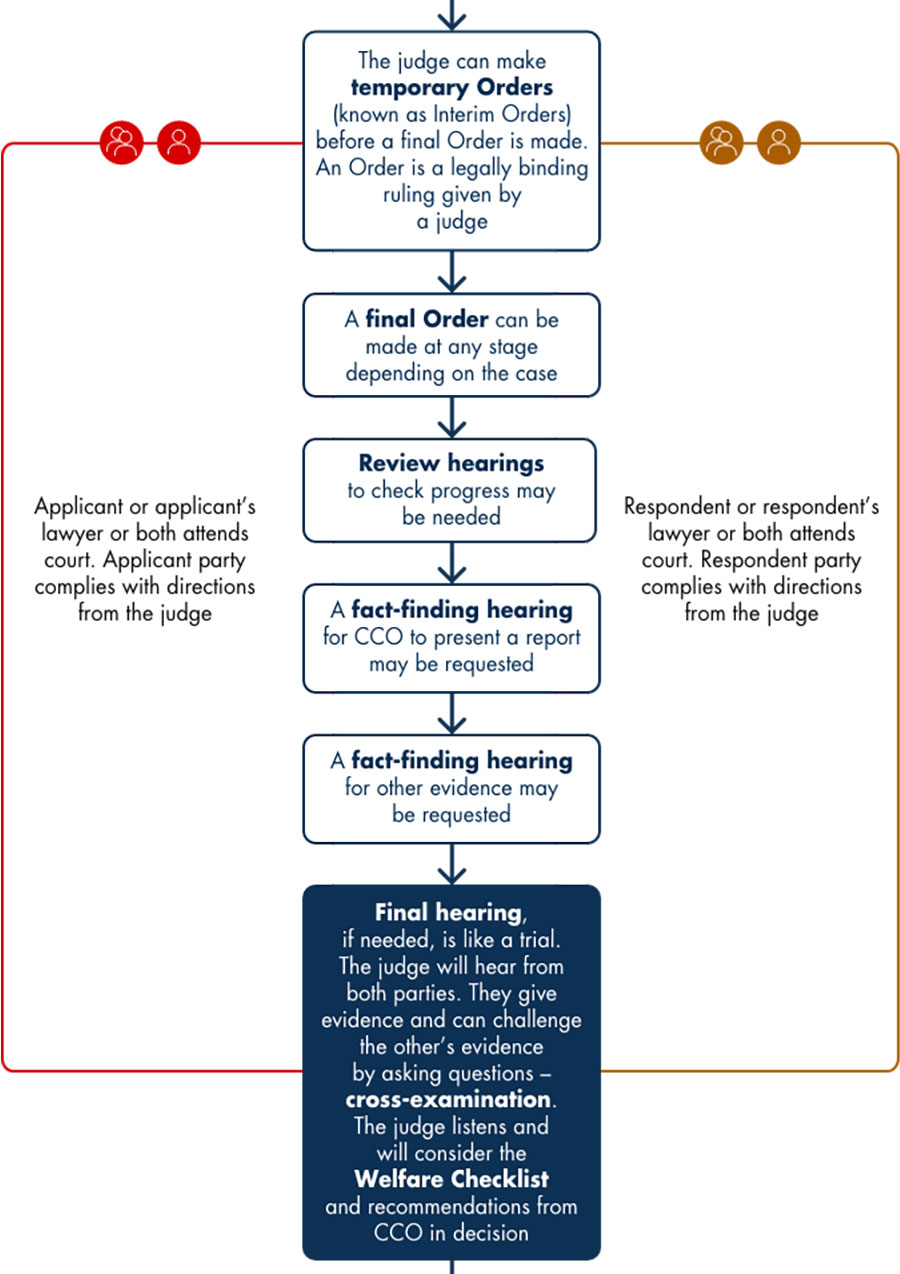
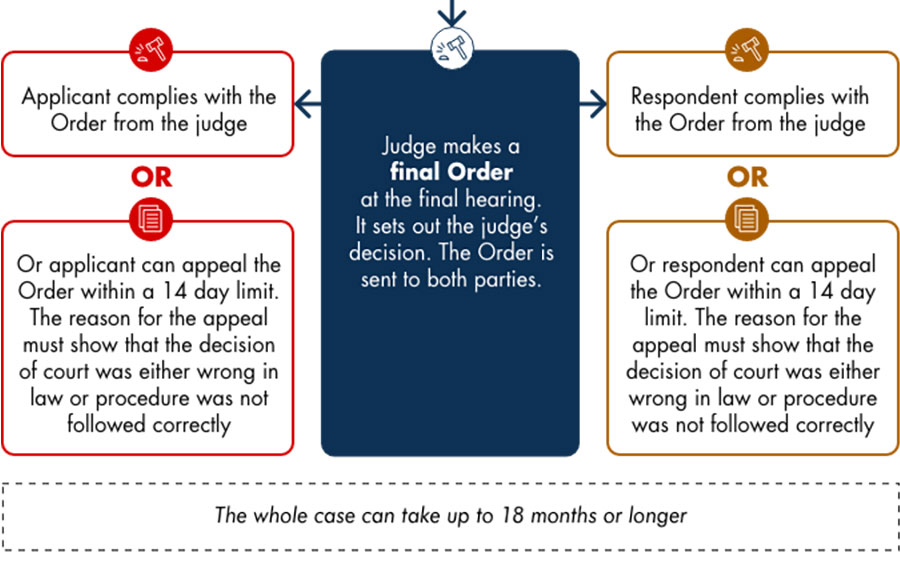
The flowchart has three columns running in parallel downwards: the left column is The Applicant; the central column is The Court and the right column is The Respondent;
The Applicant is the person making the request to court; the process starts with the Applicant, who completes the application form to request an Order and submits the form and fee to the court;
The court receives the application fee; the court sends documents to the other party – the Respondent
The Respondent receives the documents and replies to the court;
The court receives the Respondent’s reply, sends a date for first hearing to the Applicant and arranges for a summons to be served on the Respondent;
The Applicant receives the letter from the court with the date and the place of the first hearing;
The Respondent receives the summons with the date and place of the first hearing;
Note – It can take up to 6 weeks from application to this point;
Option to click to view family proceedings court layout; otherwise continue with the flowchart;
The Applicant may apply at any time for an additional Order or directions or withdraw their application;
The Respondent can apply for their own Order at any time.
The first court appearance is called the first directions hearing. The judge decides how the case will proceed depending on the circumstances in the case. They need to gather information to be able to make a decision so they may require documents to be submitted, for example, statements of evidence. They may ask the Court Children’s Officer (CCO) to visit the parents and children and prepare a report. The CCO sends the report to the parties and court. If the child is at risk, the judge may appoint a lawyer to represent the child’s best interests. Or the judge may make an Order straight away.
If the Applicant is legally represented, the Applicant and the Applicant’s lawyer attend the hearing. If the Applicant is self-represented, the Applicant attends.
Similarly, if the Respondent is legally represented, the Respondent and the Respondent’s lawyer attend the hearing. If the Respondent is self-represented, the Respondent attends.
After the first directions hearing, the Applicant complies with what the judge asked for, for example, they prepare documents;
Similarly, the Respondent complies with what the judge has asked for, for example, they prepare documents.
Both the Applicant and the Respondent send the documents to the court and serve the documents on the other party as required.
The court receives reports, documents, etc.
Note – Regular hearings may be timetabled to progress the case.
The judge can schedule other hearings over the weeks or months – click option to view process for complex cases.
For the subsequent hearings, the Applicant or Applicant’s lawyer or both attends court. The Applicant party complies with directions from the judge.
Similarly, the Respondent or Respondent’s lawyer or both attends court. The Respondent party complies with directions from the judge.
At the subsequent hearings, the judge can make temporary Orders (known as Interim Orders) before a final Order is made. An Order is a legally binding ruling given by a judge.
A final Order can be made at any stage depending on the case.
Review hearings to check progress may be needed.
A fact-finding hearing for the CCO to present a report may be requested.
A fact-finding hearing for other evidence may be requested.
The final hearing, if needed, is like a trial. The judge will hear from both parties. They give evidence and can challenge the other’s evidence by asking questions in the cross-examination. The judge listens and will consider the Welfare Checklist and recommendations from CCO in decision.
Judge makes a final Order at the final hearing. It sets out the judge’s decision. The Order is sent to both parties.
The Applicant complies with the Order from the judge OR the Applicant can appeal the Order within the 14 day limit. The reason for the appeal must show that the decision of the court was either wrong in law or procedure was not followed correctly.
Similarly, the Respondent complies with the Order from the judge OR the Respondent can appeal the Order within the 14 day time limit. The reason for the appeal must show that the decision of court was either wrong in law or procedure was not followed correctly.
Note – the whole case can take up to 18 months or longer.
Which court deals with family cases
Once a case is accepted by the Family Proceedings Court, it may then take a different route depending on how serious or complex it is.
The diagram below maps the most typical route and other routes depending on complexity - click to enlarge.
Family Proceedings Court
Most Family Proceedings Cases are decided in the Family Proceedings Court.
Initial Family Proceedings applications are heard by a District judge at Magistrates’ Courts.
The Family Proceedings judge is usually helped to make a decision by two additional people, called Lay Magistrates - see Who’s who.
If you are making an additional application in your case or seeking to change or cancel an existing Order, make sure you make it to the correct level of court. So, if your case is before or was decided by the Family Proceedings Court, then additional applications should be made to the Family Proceedings Court.
Hearings at the Family Proceedings Court are not audio-recorded.
Family Care Centre and High Court
Most family cases begin at a Family Proceedings Court. In exceptional circumstances, a case may begin in a higher level court – the Family Care Centre.
A case may also begin at a Family Proceedings Court but may be transferred to a higher level court - the Family Care Centre or the High Court. The judge issues an Order to transfer the case under The Children (Allocation of Proceedings) Order 1996, which sets out the reasons for transferring it. If this happens, the next listing of the case will be fixed by the court the case has been transferred to and you should address all future correspondence to that court.
Cases at the Family Care Centre are heard by a County Court judge.
Cases at the High Court are heard by a High Court judge.
If you are making an additional application in your case or seeking to change or cancel an existing Order, make sure you make it to the correct level of court. So, if your case is before or was decided by the Family Care Centre, then additional applications should be made to the Family Care Centre.
Hearings at the Family Care Centre or the High Court may be audio-recorded.
Further information
For more on the court structure of Northern Ireland, see Court Structure of Northern Ireland.
For contact details of the courts - see NICTS contact details or Court office emails.
What court staff can do
The staff of the Northern Ireland Courts and Tribunals Service (NICTS) are not lawyers and have to remain neutral. They cannot give you legal advice or advice about how to represent yourself. They will try and help you with queries but can only give you basic information about the court processes. If you know what you are looking for, they can give you the information you need.
Here is a list of what court staff can and cannot do:
NICTS staff can
- provide you with general information about the court
- give you general information on court rules, procedures and practices
- provide you with forms or tell you how to obtain them
- give you some basic help in completing some forms, but they cannot tell you what to say in a form about your case
NICTS staff cannot
- give you legal advice about your case
- express an opinion on your case or give you advice about whether you should file a case/commence proceedings, or whether you should take any particular action in a case
- recommend a course of action
- recommend a particular solicitor
- tell you what to say at a hearing
- comment on the outcome of your case or on a judicial decision
- deal with complaints about the legal profession or a judicial officer
- provide copies of court documents (unless the appropriate fees are paid)
- complete forms on your behalf
If you have a query, you can check this website, including our Pathfinder tool – see Pathfinder tool. If these do not help then you can email the court office with the query. Bear in mind that court offices are busy and it may take a few days for someone to reply to you.
If you need to call to the court office, for example to collect a copy of an Order, you should arrange this in advance and bring identification.
If you have a query, you can email the court office in the first instance - see here for contact details of the courts in Northern Ireland - see NICTS contact details or Court office emails.
Overlapping public & private family cases
Cases between family members, such as between a mother and father, are private family cases and cases between a Health and Social Care Trust and a family are public family cases.
There are some occasions where there can be an overlap in private and public family cases. For example, kinship carers may be a party to a case. The Health and Social Care Trust will have made the arrangements for the child to live with the kinship carer. That means that a case involving a kinship carer will usually be supported by the Trust.
These are particularly complex cases and this website does not include information about public family cases. If you need information about a public family case, you may want to consult a legal representative.
The Law Society of Northern Ireland has a directory of family solicitors in Northern Ireland.
Overlapping domestic proceedings & family proceedings
As well as making arrangements for a child, some parents may also want to make formal arrangements for how they should behave towards each other. To do this, they can apply to a Domestic Proceedings Court for a court Order.
For example, one parent may apply for a Non-Molestation Order to be made against the other parent. This means there are restrictions on them contacting the other parent. Another example is an Occupation Order which may prevent one person from living in their usual home.
As cases about child arrangements and cases about the arrangements between the parents are closely connected, the judge in a family proceedings case, at the Family Proceedings Court or Family Care Centre, may also deal with the case between the two parents. This often happens at the beginning of the case, but the judge may review the domestic proceedings case as the family case progresses.
This website provides information about family proceedings cases only and it does not provide information about domestic proceedings.
If you need information about domestic proceedings, you may want to consult a legal representative. See also Department of Justice Applying for a Non-Molestation / Occupation Order
Privacy in family court proceedings
In family proceedings, court hearings are not public.
You are not allowed to record a hearing.
At the Family Proceedings Court there is no audio recording of the hearings and no stenographer to take a written record. It is a good idea to make notes yourself.
In the Family Care Centre and the High Court, hearings may be audio-recorded. However, it is a good idea to make your own notes because you are not given a record of the hearing unless you request one. You can apply for a record of the hearing.
Recordings of court proceedings
You are not allowed to record a hearing.
Recordings of court proceedings may be made in the Family Care Centre or the High Court only, not in the Family Proceedings Court. You can request an audio-record or written transcript of your hearing held at the Family Care Centre or the High Court. See Department of Justice Audio Recordings and Transcripts of Court Proceedings.
Confidentiality of case documents
It is important to remember that in a case involving a child, no document from the court proceedings can be shared with any other person except a party, a legal representative, or a Court Children’s Officer without the permission of the judge. This includes the Court Children’s Officer’s report.
If you do not have legal representation and you are assisted by a McKenzie Friend, you can ask the judge for permission to share all papers related to the application with them.
You should do so as soon as possible - see Get support - McKenzie Friend.
A request for documents to be shared with another person can be made during a hearing or formally in Form C2 and submitted to the court. It should set out the reasons for the request.
The law and rules in family cases
The Children (Northern Ireland) Order 1995 is the main legislation governing the care, upbringing and protection of children in Northern Ireland. It affects all those who work and care for children, whether parents, paid carers or volunteers.
There are rules which set out the procedure of how family cases operate. In Northern Ireland, there is no single set of rules which provides a procedural code for all family proceedings. The rules which apply in a case will depend on the level of court which the case is before.
At the centre of all court rules is the ‘overriding objective’ which requires the court to efficiently deal with the case in a fair way which reflects the nature of the case, the child’s welfare, the court’s resources and that the parties are on an equal footing.
In the Family Proceedings Court, the procedural rules are set out in the Magistrates' Courts (Children (Northern Ireland) Order 1995) Rules (Northern Ireland) 1996.
These rules are important and specify how applications should be made, the manner and form of how evidence can be provided and presented to the court, the appointment of professionals and reports on the child’s welfare, the confidentiality of documents, the timing and nature of hearings and how Orders are made.
In the Family Care Centre, the procedure is generally set out in Part IV of the Family Proceedings Rules (Northern Ireland) 1996 which provides for many of the same procedures relating to the Family Proceedings Court and also the rules relating to appeals of a judge’s decision.
In the Family Care Centre, litigants may also have to use the County Court Rules 1981 to bring certain types of proceedings.
In the High Court of Justice and His Majesty’s Court of Appeal, litigants may also have to use the Rules of Court of Judicature (Northern Ireland) 1980, updated February 2021.

